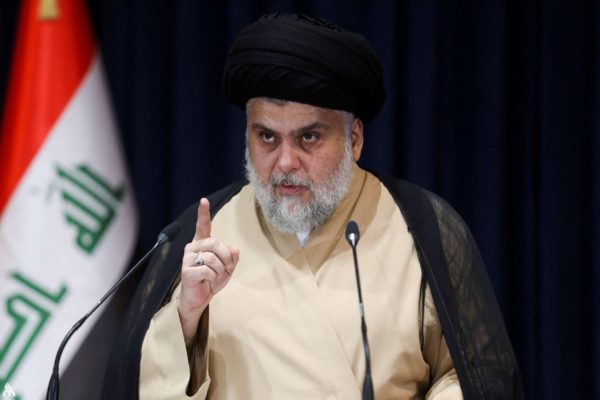BAGHDAD, Aug 29 (Reuters) – Two Iraqis were killed on Monday after powerful Shi’ite Muslim cleric Moqtada al-Sadr said he would quit politics, prompting his loyalists to storm a palatial government complex in Baghdad and leading to clashes with backers of rival Shi’ite groups.
Young men loyal to Sadr charged the government headquarters in Baghdad’s secure Green Zone, once a palace of dictator Saddam Hussein, and took to the streets outside the area where they skirmished with supporters of rival Tehran-backed groups.
As gunfire echoed over the capital, some people were seen firing guns towards the ranks of supporters of Sadr, Reuters witnesses said, while others fired into the air in a nation awash with weapons after years of conflict and unrest. Supporters of rival groups also hurled rocks at each other.
The flare-up followed a political deadlock lasting months that has blocked the formation of a new cabinet. The army swiftly ordered a curfew.
In addition to the two people killed, several dozen were injured, police and medical workers said.
“I hereby announce my final withdrawal,” Sadr had announced earlier on Twitter, criticising fellow Shi’ite political leaders for failing to heed his calls for reform.
The clashes erupted hours after that declaration, prompting his supporters, who had alredy been staging a weeks-long sit-in at parliament in the Green Zone, to demonstrate and storm the main cabinet headquarters.
Iraq’s military declared an open-ended nationwide curfew and urged the protesters to leave the Green Zone.
During the stalemate over forming a new government, Sadr has galvanised his legions of backers, throwing into disarray Iraq’s effort to recover from decades of conflict and sanctions and its bid to tackle sectarian strife and rampant corruption.
Sadr, who has drawn broad support by opposing both U.S. and Iranian influence on Iraqi politics, was the biggest winner from an October election but withdrew all his lawmakers from parliament in June after he failed to form a government that excluded his rivals, mostly Tehran-backed Shi’ite parties.
Sadr has insisted on early elections and the dissolution of parliament. He says no politician who has been in power since the U.S. invasion in 2003 can hold office.
IMPASSE
In Monday’s announcement, Sadr said he would close his offices, without giving details although he said cultural and religious institutions would remain open.
Sadr has withdrawn from politics and the government in the past and has also disbanded militias loyal to him. But he retains widespread influence over state institutions and controls a paramilitary group with thousands of members.
He has often returned to political activity after similar announcements, although the current deadlock in Iraq appears harder to resolve than previous periods of dysfunction.
The current impasse between Sadr and Shi’ite rivals has given Iraq its longest run without a government.
Supporters of the mercurial cleric first stormed the Green Zone in July. Since then, they have occupied parliament, halting the process to choose a new president and prime minister.
Sadr’s ally Mustafa al-Kadhimi, who remains caretaker prime minister, suspended cabinet meetings until further notice after Sadrist protesters stormed the government headquarters on Monday.
Iraq has struggled to recover since the defeat of Islamic State in 2017 because political parties have squabbled over power and the vast oil wealth possessed by Iraq, OPEC’s second-largest producer.
WHY DID HE QUIT
Sadr’s decision to quit politics reportedly came after Kazem ( or Khadem) Haeri , an Iraqi Shiite cleric of the Sadrist Movement who lives in the holy city of Qom in Iran , called on his followers in Iraq to start following Iran’s Supreme leader Ayatollah Ali Khamenei.
“Khamenei is the best person for the leadership of our people and removing the aggressors,” read Haeri’s statement. “Maintain unity and do not allow the country’s opponents to ignite conflict.”
“Al-Haeri ‘s decision is not a voluntary one,” Sadr said
The Supreme Shiite cleric, Kazem Haeri quit also the same day as Sadr and after making his statement . Al-Haeri announced his resignation from the position of Marja, due to old age and illness This was described as the first time in history a Marja has ever resigned from his position.
According to reports from Qom in Iran, Khamenei pressured Haeri to make the statement , this is what prompted Sadr to say “Al-Haeri ‘s decision is not a voluntary one “
Al-Haeri is considered the successor to Mohammad Baqir al-Sadr, ( Moqtada al-Sadr’s father ) but since al-Haeri has resided in Iran since the 1970s he has not been able to fully take on this position. Despite his exile, he serves as the advisor to Moqtada al-Sadr .
Al-Haeri has also issued fatwas against the U.S.-led occupation of Iraq, and he publicly criticized Muqtada al-Sadr for potential weakening of the Shii’te establishment
REUTERS/ YA LIBNAN / NEWS AGENCIES
REUTERS


Leave a Reply
You must be logged in to post a comment.